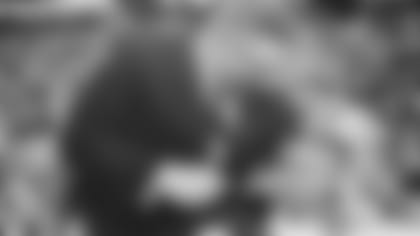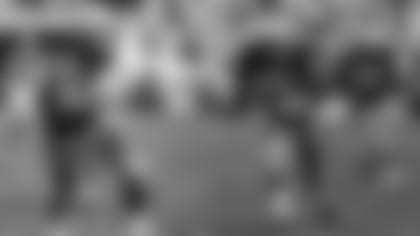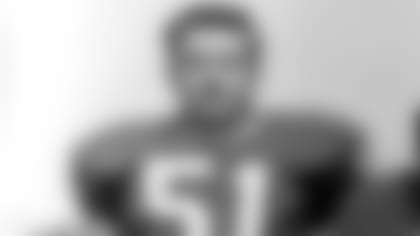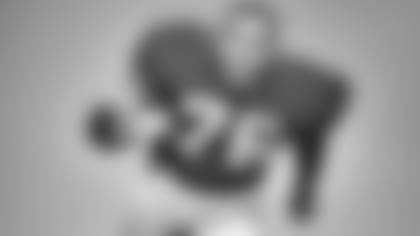*Cliff Christl started gathering oral histories with former Packers and others associated with the team in 2000 and will continue to gather them as Packers historian. Excerpts from those interviews will be periodically posted at **www.packers.com*
Jerry Kramer played guard for the Packers from 1958 to 1968 and was inducted into the Packers Hall of Fame in 1975. In 1969, Kramer was named the only guard on the NFL's 50th Anniversary Team chosen by the Pro Football Hall of Fame selection committee. Kramer was a five-time Associated Press All-Pro and a three-time Pro Bowl pick.
On the Packers' 1958 1-10-1 season: "There wasn't any discipline. There wasn't any conditioning. Quite frankly, I was waiting to get traded. I had been told at the College All-Star Game I wouldn't make it. 'They have five veteran guards and you won't make it.'"
On his competition in 1958 with sixth-round draft pick Ken Gray, who got cut but went on to play 12 years with the Cardinals and make six Pro Bowls: "He was playing defensive tackle and guard, and he was a good football player. I remember going down to Bosse's to get a newspaper and Ken Gray was standing across the street. He says, 'Son of a (buck), you had a no-cut contract didn't you?' I said, 'What's a no-cut contract?' But he was upset. He had a good camp, and I think it came down to me and Ken."
On losing to the Baltimore Colts, 56-0, in 1958: "We were down 56 to zip late in the ballgame, and we put Joe Francis in. He was kind of a scrambler and we got across midfield probably for the first time in awhile. We get down to about the 40 and the whole flippin' stadium comes alive. 'Hold 'em. Hold 'em. Hold 'em.' The whole stadium is roaring. I remember the rain and the roar. And they held us."
On meeting Curly Lambeau in Los Angeles before the final game of the '58 season:"We were (at) a restaurant called, 'The Ram's Horn.' Curly comes in. It was (Paul) Hornung, (Max) McGee, Ron Kramer, Jimmy (Taylor), myself, maybe Fuzz. There were four, five, six of us, and we sit down with Curly at a booth and start having a few drinks. We're pretty excited to meet Curly. We had Scooter McLean as coach and were in the midst of that 1-10-1 season. Curly was a symbol of success and achievement and those kinds of things from yesteryear. So we start talking to him about coming back. 'Hell, yes, I'd like to come back.' He very clearly stated that he'd like to come back and coach. So we're pretty excited about that. We think, 'Curly's coming back. He's a proven winner. He understands it. And that would be pretty cool to have Curly Lambeau (as coach).' Of course, sometime in (January) they announce they've hired an assistant coach from the New York Giants and we thought it was the dumbest thing we've ever heard."
On whether Lambeau was campaigning for the job: "He just made it known and it was kind of a delicate position because Scooter hadn't been fired yet. Everybody knew that he would be. But I wasn't the kind of guy who would go to the executive committee and say, 'Hey, you know.' But we assumed Curly would make his wishes known and that they would have a choice and the choice should be obvious if they had a chance to get Curly back. We had no history about his baggage, just his history and his record."
On his first impressions of Packers fans when he reported in 1958:"There were always fans around wherever you went, and they were always intense. First year, when we had that (bleep) season, we'd go downtown after the first few games. Then it got so painful to try and explain why we were such a (lousy) team, we started having our parties in the locker room. We'd go home, get a sitter, bring back a bottle. We had a pop machine. We'd clear out the floor, dance and have our parties there. Eighteen, 20 guys and their wives. It was tough when you were losing because of the closeness of the fans. But when you were winning, they couldn't do enough for you. You'd go into a bakery to buy some bread, and they wouldn't let you pay for it. Couldn't pay for your dry cleaning. You couldn't pay for anything. It was almost uncomfortable."
On the players hanging out at the Piccadilly, a bar just outside Green Bay, in 1958 and then having Vince Lombardi put it off limits in 1959: "There weren't any fights or brawls. It was just fun. Hot spot. Hot ladies. Hot times. I never understood why it was put off limits. Maybe Lombardi was showing his authority. Hornung and McGee loved it, so it was a good place to be. They had live music. I don't think (Hornung and McGee) ever (stopped going there despite Lombardi's orders), but a lot of other guys quit. 'What's the point? They've got a band over here, too.'"
On where the players started hanging out after that: "Speed's used to be the big hangout. That was probably where we spent most of our time. Speed's had a band, too."
On the Packers' line coach in 1958, Nick Skorich, the only staff member Lombardi tried to retain from McLean's staff and later a winning head coach in Cleveland: "He was a good coach. He was a bit harsh and didn't have a lot to say. But when he had something to say, it carried a lot of weight."
On arriving for training camp in 1959 and heading to the Packers' old office building on Washington Street in downtown Green Bay:"I met Lombardi there – Joe Francis and I. We came back in '59, Lombardi's first season, and camp opened like three days early for rookies. So we came back early and decided to play a little golf, drink a little beer, have a little fun before two-a-days. We go into the office and Jack Vainisi is there. We needed a place to stay. Jack said, 'The dorm isn't open yet. It isn't open until tomorrow.' We're going back and forth. I said, 'Jack, hotels cost 8 bucks.' Lombardi walks by. He doesn't look at us, doesn't say hello. 'What's the problem?' 'Well, open the dorm. Put 'em up.' Walked off. That was it. We got in the dorm. That was the good news. We went golfing and went drinking some beer. The next morning I'm walking down the steps with my golf clubs over my shoulder. (Lombardi) says, 'Where the (heck) you going?' 'We're going to play golf, coach.' 'Like (heck) you are. You're in the dormitory. You make all meals, all meetings, all curfews, just like everybody else. Now get ready for practice."

On Lombardi's training camp practices: "His two-a-days in his first couple years were just brutal. It was trying to stay alive."
On his first contract negotiations with Lombardi:"I made $8,000 my first year. Coach Lombardi sent a contact to my home in Boise, where I lived at the time, for $8,300. I sent it back. He sent it back. I sent it back. Finally, he gets on the phone. 'What the (heck) is going on out there?' I said, 'Coach, a $300 raise isn't much. I've got to have more.' He says, 'I'll tell you what, you get six blocking awards I'll give you a $500 bonus.' 'What the (heck) is a blocking award.' 'Well, we grade every play of every game. You get 65% running and 85% passing, you get a blocking award. You get six blocking awards, 12-game season, you'll get a $500 bonus.' That's fair. The first six games, I get five blocking awards. The last six games, I don't get a blocking award. Bucks were tight at that time. I think (Lombardi) was making like $35,000 as a first-year salary."

On the 1962 NFL Championship Game when he kicked three field goals in a 16-7 victory over the New York Giants: "The biggest play for me was the third field goal. That pretty much put the game out of reach. I knew that going on the field and the pressure that was there. I knew if I kicked the field goal we'd win the game. If I missed the field goal, we had a chance to lose the game. So that was a big play for me."
On his key block on Paul Hornung's 13-yard touchdown run against Cleveland in the 1965 NFL championship:"I had a feeling we needed to score. I'm not going to say it was the biggest play of the game, but it was a big play. If you watched me closely on that play there was a linebacker who was starting to blitz or come up the middle, and I knew if I stopped and blocked him, the cornerback would kill Hornung. And I knew if I didn't do something to him, he was going to get Hornung. So I'm running full speed – I had pulled four, five steps, I guess – and I put both hands out and kind of chucked the guy to just stop him enough so he couldn't get to the ball carrier. It was an instinctive move that happened in the flash of a second. So I was (still) able to get outside and (when) the cornerback came up I was able to get a cross-body block on him. I didn't really hit him as much as shield him from Hornung. But the critical part of the play was the chuck on the linebacker inside."
On Travis Williams' 46-yard touchdown run in a playoff victory over the favored Los Angeles Rams in 1967: "Big play. Huge play. I knew we put the tight end on the line of scrimmage next to the tackle to neutralize Deacon (Jones). I remember hitting Merlin (Olsen) and stopping him, and he started to pursue outside, and I looked outside and saw Travis. He's gone. That kind of stunned (the Rams) a little bit. It was an off-tackle play and (Williams) bounced it outside. I wasn't pulling. Marv Fleming was in on the play and (along with Forrest Gregg) handled Deacon."
On riding the train to road games early in his career:"We took the train to Chicago. We did that for quite awhile. It was always kind of a fun trip. It was different, but it wasn't long enough to be burdensome. Three hours. Something like that. We'd play cards. Coming home could be a little different. I remember Lamar McHan probably got himself cut on the way home on a train. He got to drinking a little bit and got to explaining some things to Coach Lombardi about how he needed to get more playing time or why his passes were being intercepted. I'm not quite sure exactly what the basis of the discussion was. (But) it got a little hot. Lamar was (upset) and Lombardi just chewed on him."

On Ray Nitschke's off-the-field problems early in his career:"First couple years, Ray was a nasty drunk. Not only was he vulgar and crude, he was a miserable son of a (gun) to be around. We were in Speed's, and he and I had clashed down at the College All-Star Game. I think I called him a 'mental giant' or something like that. So we're at Speed's one night and he's loud and obnoxious. I had enough of it and said, 'Let's go. Let's go outside and settle this.' I get to the back door and he's right behind (me). We stepped out the door and I grabbed him around the throat and put him up against the door. He goes, 'I don't want to fight you. You're my teammate, man.' I go, 'OK, then. Shut … up.' I don't know if Ray had much fight in him. I think he was a 'Junkyard Dog.'"
On how much Nitschke changed once he settled down: "He was really a sweet man. Later, he became the most thoughtful, caring, loving guy, just a wonderful guy. I've had more people tell me stories about autograph sessions where he'd get up and go outside to meet with like an MS patient and spend 10, 15 minutes with them and other things like that. I believe he was always that kind of person. The South Side of Chicago was not the gentlest place to grow up. So he snarled and snapped and bit whenever anybody got close to him, much like a junkyard dog who had the (crap) kicked out of him 100 times. So to protect himself, he'd just snarl and growl. After he quit drinking and found Jackie (his wife) – you know he didn't start until about his third year – and had the love of a lady and the love of a team, I think he relaxed. The main thing was he quit drinking. But the other things had to be in place, too. Whatever, he became a totally different guy and a different player. He was guessing before that."
On why it took Nitschke basically three years under Lombardi to supplant Tom Bettis as the starting middle linebacker:"Bettis was a tough kid. Nitschke was always guessing. He wouldn't follow his keys. Bettis followed his keys and was much more consistent. Ray would make a great play and then miss three in his early years."
On defensive end Bill Quinlan's confrontation with Lombardi that led to his departure following the 1962 season: "I remember Quinlan and Lombardi clashed out in San Francisco, I believe. I remember early that week, the all-pro teams were due out in a day or two. That was what started the conversation. Willie (Davis) was still kind of new (to the team) and we hadn't spoken a lot. We hadn't become close. I was getting ready to go in the shower and Willie said, 'J, you had a (heck) of a year. You should be all-pro.' I knew Quinie and had run with him a little bit. Willie was a pass rusher and Quin was a run stopper, basically. Quin had short arms and didn't really put much pressure on the passer. Anyway, I said to Willie, 'You had a (heck) of a year. You ought to make all-pro.' A couple days later, the all-pro teams came out. Quin (didn't make it and) went out and had quite a bit to drink, which he could do. 'Cutty Sarkie on the rocky.' He came back to the hotel and called Lombardi. Then he went back out and got drunker, broke curfew and came in like 2 in the morning. We had one more game in LA and a playoff game. Coach never said a word. Then after the playoff game, Bill was traded."

On Lombardi trading all-pro center Jim Ringo in 1964:"I got in a huge contract fight with Lombardi. I got a huge raise my fifth year, a monster jump. I (didn't sign) through the preseason. I finally signed just a few days before the season started, and (Lombardi or someone) went to Ringo and gave him a $1,000 bonus because they had to pay me so much. So Ringo comes up to me, 'How much you making?' I said, '19.' He said, 'By (gosh), next year they're going to pay me 25 or they're going to trade me.' You know what happened the next year. But that was where it started."
On the loss of Ringo: "Teams would play almost exclusively 4-3. They'd play it as an odd-man line once in awhile, but it was still a 4-3. Rarely, did they put anybody over the center. Jim was about 220. He had great quickness to make the onside cutoffs and come out and get on linebackers. We averaged like 8.3 yards per carry on that sweep during Lombardi's first three seasons. After I got that raise, we traded Ringo. And about the same time, we traded Ron Kramer. He was having marital problems and wanted to be traded to Detroit to try and save his marriage, his family. You know (backfield coach) Red Cochran was always being irreverent. A year or so goes by and we're talking in a meeting, 'What the (heck) happened to our sweep? It isn't going the way it used to.' We had something like a 4-yard average instead of an 8.3. I don't remember exactly. Cochran goes, 'Well, half of it is in Philadelphia (where Ringo was traded) and half of it is in Detroit (where Kramer signed).' Ringo could make that onside cutoff, which many centers couldn't do. He had really good quickness. And Ron was just a super tight end. He was like a big mule out there. The two of them were an integral part of (the sweep)."
On promising linebacker Nelson Toburen, whose career was cut short in 1962 by a neck injury: "He was kind of a Western boy. I thought he was a (heck) of a player. He was starting when he got hurt. He was kind of tall, kind of narrow. Good speed. Good head. And had no fear."
On playing the weekend of President Kennedy's assassination: "That was a sad weekend. Didn't feel like playing, didn't know if we should be playing. Coach felt like we shouldn't (play); the league decided we should."
On going to Chili John's, a favorite hangout of many Lombardi Packers when it was located in downtown Green Bay: "We'd go every Thursday. Don Chandler and I had a thing going. We'd kick for who bought. He and I always had a contest, and I got to buy most of the time."
On Hornung: "Paul was always cocky and a showoff, but underneath all (of) that was a real good mind. He was bright and he ran that way. He wasn't fast, but he'd set you up."

On his early impressions of Bart Starr: "Bart was like methane gas: Colorless, odorless, tasteless, virtually invisible. He couldn't create a controversy if he wanted to. Joe Francis was there and vying for the job. Lamar McHan was half a psycho case. He'd get all (mad) and get on Coach Lombardi and make a fool of himself. And Vito, Vito, Vito! Babe (Parilli) was a capable guy, a competent guy. He was part of that mix."
On Bart Starr winning the players' respect in a victory over the Chicago Bears in 1961, Starr's first full season as the starting quarterback: "That was just a moment in time where I understood who Bart was. I think it was a moment where everybody on the team understood Bart Starr had a lot of steel in his back. He didn't have to necessarily shout and scream to be one of the guys. He was a quiet guy, but he had plenty of (bleep)."
On what exactly happened in that game after middle linebacker Bill George leveled Starr with a forearm to the face well after he had delivered a pass:"George looked at him and said, 'That ought to take care of you Starr, you (bleep).' Bart pointed at him and said, '(Bleep) you Bill George, we're coming after you.' I've known Bart for 51, 52 years and I've heard him say the f-word one time. It was appropriate. I said to him, 'Bart, you better go to the sideline and get sewed up.' He said, 'Shut up and get in the huddle.' He was bleeding. It was flowing down the front of his jersey."
On Bart Starr's development as a quarterback: "The beautiful thing about how it evolved was that we didn't need Bart in '61 and '62. As Bart got stronger and more experience and better, the running game started to go to (heck) and he was able to pick it up with the passing game. The evolution was perfect as far as how that all worked out."
On the team being just as successful when backup Zeke Bratkowski played: "When Zeke came in a game, I never had a moment's hesitation. Zeke was a heck of a player. The whole Zeke story and how he sacrificed himself for Bart and helped coach Bart… Down on the field, every series when Bart came off, he talked to Zeke. He didn't talk to Red (Cochran)."

On left tackle Bob Skoronski: "Bob had the best grades of anybody on the team: day after day, year after year. Bob was the most consistent player on our team, and he had the grades. That's not my opinion. Those were the grades."
On him and Skoronski both retiring following the 1968 season, the year after Lombardi stepped down as coach: "I remember Bob's last (home) game in '68, my last game. We were pretty much out of it and were playing Baltimore. Phil (Bengtson) was coaching. So Bob gets up before the game and says, 'This might be my last game for the Green & Gold. By (gosh), if you think I'm going to lie down, you got another thing coming.' He was brilliant and incredibly emotional. He had everybody raring to go. Then Coach Phil came in. 'Uh, uh, uh. Want you to run down on the kickoffs. Uh, uh, uh. Want you to cover those punts.' It just let the air out of the room."
On how often Lombardi talked to the team: "You never knew what the (heck) he was going to do. If he was going to do or say something, he usually did it on Thursday. Thursday was the day we'd get a pretty good speech. Before the game, it was generally pretty quiet, pretty quick. I remember before playing the Bears one time. We were all pumped. We had to win the game. He calls us up and says, 'Anybody know why Belgians are so strong?' 'No coach. Why?' Because they raise dumbbells.' 'What a silly joke. That's stupid.' But we were all too high. He wanted to bring us down a little bit."
On one of his lasting theories about Lombardi:"I believe most of his actions were acting. He would get (bleeped) off and he'd put on a show. There had been an article (one year) in the Chicago Tribune about the best guards in the NFL. That was too much publicity for a guard. They'd get the big head. And they might get a little lazy if they start thinking they're really good, so I'm sure his thought was, 'I'm going to have to bring him down a little bit.' We ran a sweep (in practice). A rookie guard stumbles, the back stumbles, then I stumble. The whole thing is a mess. Here he comes. 'Best guards in the NFL, my (bleep). We've got the worst guards in football. The worst!' He's really (bleeped) about this play, but he was putting on a show. And he knew he had gone too far. When he saw me get up, he walked away and got as far away from me as he could. But he was not involved in that anger. He was doing that for my benefit. He was like a (gosh darn) actor."
Kramer, 79, lives in Boise, Id. The excerpts above were taken from interviews conducted in 2010 and 2012.
For more of Cliff Christl's historical perspectives, click here.















